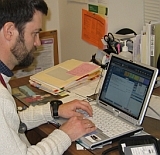 (Host) Over the next five years, more than half of all doctors in Vermont are expected to install electronic medical record systems in their offices.
(Host) Over the next five years, more than half of all doctors in Vermont are expected to install electronic medical record systems in their offices.
Doctors say the new records will allow instant access to a patient’s health history and help reduce medical mistakes, so the quality of care will improve.
As VPR’s Bob Kinzel reports, electronic records could change future visits to your doctor.
(Sounds of medical office)
(Burdick) "This chart that I’m looking at right now it’s a patient who’s 85 years old it’s about 3 inches thick so maybe 400 pages or so it’s kind of ratty it’s been used a lot dog eared."
(Kinzel) Dr. Tim Burdick is a family practice physician at the Montpelier Health Center.
The massive folder he’s holding came out of one shelf of one section of floor to ceiling records that fill an entire room.
In today’s health care crisis, Burdick sees an opportunity for efficiency. So he’s leading an effort at Central Vermont Medical Center to help convert many of the facility’s doctors to an electronic system.
He says he can organize a patient’s health history, send a patient’s records to another doctor, and that the new system will make him a better doctor:
(Burdick) "I can bring up what we call a template and basically a template is a semi prewritten office note specific to a particular issue so in this case I’m going to bring up the diabetes template and this will trigger me to ask a bunch of pertinent questions and we can work through that as I go on and click in different areas to fill in the appropriate information."
(Kinzel) How will patients react to their doctor using a lap top during their office visit? Burdick thinks the reaction will be positive:
(Burdick) "Patients are used to using electronic systems for their banking for on line purchasing for a variety of things in many ways I think they’re thankful that finally the medical system is catching up with all the other computer systems we are so used to using."
(Sound of Rutland Emergency Room)
(Kinzel) Electronic medical records are now being used in the emergency room at Rutland Regional Medical Center. Dr. Harry Chen says the system allows him to have direct access to a patient’s prescription drug history:
(Chen) "So it really gives me a longitudinal snap shot what’s this patient’s health been like in the past year that I don’t actually have to thumb through a hundred page medical record………In an emergency situation, clearly information is vital. We have to have it and have it quickly and it obviously makes a difference in terms of life and death sometimes."
(Kinzel) Converting to an electronic system isn’t cheap. It’s estimated that it will cost roughly $60,000 per doctor. That’s why only 13 percent of Vermont’s physicians currently have one and many of these doctors are specialists.
A group known as Vermont Information Technology Leaders, or VITL, plans to distribute a million dollars in grants to independent smaller practice doctors to help them buy an electronic system.
VITL director Greg Farnum says that while there are some short-term savings associated with these systems, the basic cost should be viewed as a long term investment:
(Farnum) "The cost is substantial enough. We will have to look at this with a longer term viewpoint, that it will take time to pay off the entire system but it is an investment in quality."
(Kinzel) Not all doctors want to fully convert to an electronic system. Montpelier physician Carol Vassar says it will be helpful for test results but:
(Vassar) "I type about 40 words a minute, two mistakes a line so I’m constantly having to correct my errors so it would be cumbersome for me."
(Kinzel) Serious privacy concerns have been raised about the electronic systems. Allen Gilbert is the director of the Vermont chapter of the American Civil Liberties Union:
(Gilbert) "For people to think that a hospital’s computer system is not going to be hacked I think is unrealistic. So we want to make sure we have the best security possible. We have continual auditing of the system to make sure that if there is a breach we know about it right away and there have to be very strong sanctions against anybody who uses the information in an unauthorized way or who hacks into the system."
(Kinzel) VITL director Greg Farnum says he understands these concerns. That’s why he wants the electronic system to produce an audit record of anyone who tries to access personal health information. Farnum notes that today’s paper system has its security problems too:
(Farnum) "Anyone looking at your file having no audit trail of your file being accessed. So both the paper system and the electronic system have risks. I believe you can manage the risks a lot better in a high quality electronic system."
(Kinzel) ACLU Director Gilbert wants lawmakers to create a state ombudsman to oversee the implementation of electronic medical systems so that consumers have someone to turn to if they suspect that an unauthorized person has tried to access their personal health records.
For VPR News I’m Bob Kinzel.